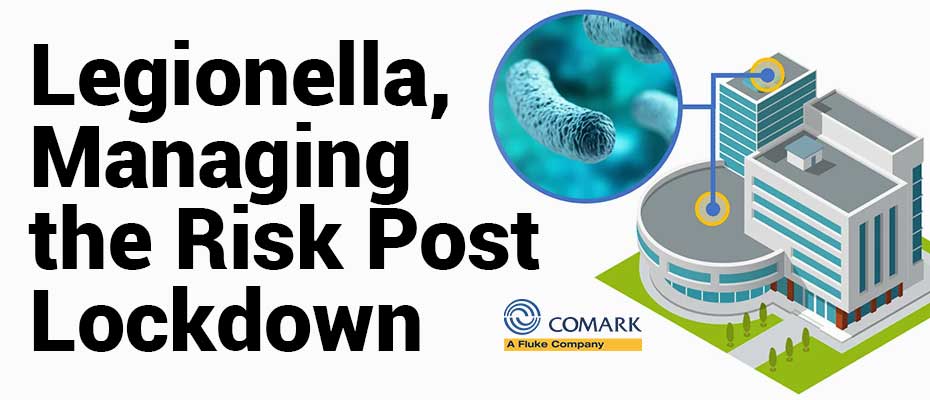
When the UK entered lockdown on the 23rd March 2020 many offices, schools, universities, leisure facilities and tourist attractions were forced to shut. Now, as the UK begins to re-open, concerns of social distancing, hygiene and sanitation have been raised. One such concern is the increased risk of Legionella outbreaks caused by a build-up of Legionella pneumophilia bacteria in the stagnant water systems of buildings that have been closed due to lockdown.
Quick Links
Transmission
Legionnaires' disease or Legionella is a severe form of pneumonia that is contracted by inhaling water droplets (aerosois) containing Legionella pneumophilia bacteria.[1] Generally, Legionnaires' disease is NOT spread from person to person.[2] The most common sources of infection include:
- Showers
- HVAC systems
- Pools
- Fountains
- Drinking water[3]
Legionella pneumophilia live in water systems and survive by feeding on rust, sludge, scale, organic matter and biofilms that build up on pipes and tanks. The bacteria thrive in temperatures between 20°C and 45°C. [4]
Stagnation of water systems, due to enforced building closures, and warmer temperatures have provided optimum conditions for the growth of Legionella pneumophilia bacteria. As a result, the likelihood of Legionella outbreaks has increased.[5]
Prevention
It is the legal responsibility of employers, property owners (e.g. landlords), and/or persons involved in the control or maintenance of facilities to assess, monitor and manage the risks associated with Legionella pneumophilia bacteria.[6] This could involve setting up a water management program which includes regular testing of water systems.
One way of monitoring the risk of Legionella is to test and control the temperature of water supplies: to prevent the growth of Legionella pneumophilia, water should be cooled to below 20°C or heated to above 60°C.[7] Comark has provided a comprehensive Legionella testing kit for this purpose. It can be used to test water towers as well as the water systems in buildings. The Comark C48LKIT Legionella Kit enables employers, landlords and maintenance teams to ensure compliance with the Health and Safety Executive’s L8 Regulations, and, to this end, includes the following items:
- Comark C48C Industrial Thermometer with a Free UKAS Certificate of Calibration
- Comark Pro1 Penetration Probe
- Comark SK21M General Purpose Fast Response Surface Probe
- Comark AK28M Flexible Wire Air Probe (1m Lead)
- Comark MC28 Blue Medium Size Case
- UKAS Certificate for Pro1 Probe (ONLY at points 0°C, +70°C and +100°C)
Alternatively, Comark offers a simpler, more economical Legionella kit, the Comark C12 Legionella Kit, which is comprised of a Comark C12 HACCP Food Thermometer, AX11B Air Probe, PX11B Penetration Probe and a KX9627 Pipe Probe.
Legionnaires’ Disease
Legionnaires’ disease or Legionella can be fatal. Everybody is at risk of contracting it, although the risk increases with age, with persons aged above 45 years being the most susceptible, and a number of other factors including:
- Heavy drinking
- Smoking
- Chronic respiratory or kidney disease
- Diabetes
- Heart disease
- Lung disease
- Impaired immune system[8]
Symptoms of Legionella include a high temperature, feverishness and chills, a cough, muscle pains, and a headache. Occasionally infected persons also suffer from diarrhoea, nausea and confusion.[9] Symptoms tend to present themselves two to ten days after exposure to Legionella pneumophilia and worsen over a seven-day period. However, it is recommended that people monitor themselves or others for symptoms for up to fourteen days after exposure as there can be a delayed onset.[10]
Legionnaires’ disease must be treated with antibiotics as soon as symptoms become apparent.[11] If at any point they develop into pneumonia the individual should seek medical treatment immediately.[12]
Similarity to COVID-19
COVID-19 and Legionnaires’ disease share similar symptoms, for instance, a fever and a cough, which can lead to misidentification. If a COVID-19 test comes back negative it is recommended that the individual is screened for Legionella, particularly if he/she has returned to work recently, or used a public shower, pool or hot tub. This is essential as self-isolation is not a recommended course of action for Legionnaires’ disease as the infected individual will require medical attention and antibiotics in order to recuperate.[13]
Further Information
For further information regarding Comark’s Legionella Kits please contact our sales team on 01642 931 329 or via our online form.
[1] HSE, What is Legionnaires’ Disease?, last accessed 21 July 2020 < https://www.hse.gov.uk/legionnaires/what-is.htm>
[2]CDC, Causes, How it Spreads and People at Increased Risk, last accessed 21 July 2020 < https://www.cdc.gov/legionella/about/causes-transmission.html>
[3] Comark, Managing Legionella Post COVID-19 Lockdown, last accessed 21 July 2020 < https://www.comarkinstruments.net/news/managing-legionella-post-covid-19-lockdown/>
[4] HSE, What is Legionnaires’ Disease?
[5] Comark, Managing Legionella Post COVID-19 Lockdown
[6]HSE, What you must do, last accessed 21 July 2020 <https://www.hse.gov.uk/legionnaires/what-you-must-do.htm>
[7] Comark, Managing Legionella Post COVID-19 Lockdown
[8] HSE, What is Legionnaires’ Disease?
[9] HSE, Symptoms and treatment, last accessed 21 July 2020 <https://www.hse.gov.uk/legionnaires/symptoms.htm>
[10] CDC, Signs and Symptoms, last accessed 21 July 2020 < https://www.cdc.gov/legionella/about/signs-symptoms.html>
[11] Comark, Managing Legionella Post COVID-19 Lockdown
[12] CDC, Signs and Symptoms
[13] Comark, Managing Legionella Post COVID-19 Lockdown


